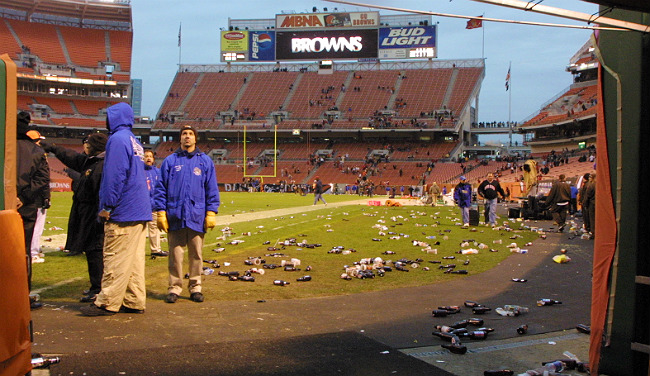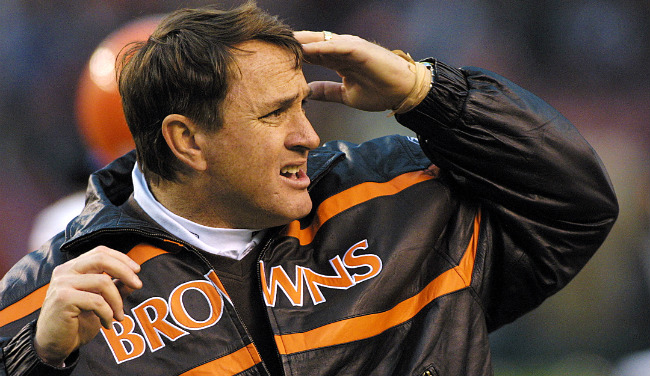
On Dec. 16, 2001, the Cleveland Browns were at 6-6, with an outside shot at making the playoffs. They were still such a new franchise following the old Browns leaving for Baltimore that Tim Couch, their first-ever draft pick, was still their starting quarterback. Down 15-10 to the Jacksonville Jaguars, Couch was leading one last drive to try and score a touchdown to preserve Cleveland’s dwindling postseason hopes.
On fourth down, wide receiver Quincy Morgan made what appeared to be a juggling catch — or at least, it was called a catch on the field. Knowing the play was suspect, the Browns rushed to the line and successfully spiked the ball, ensuring the play wouldn’t be reviewed. Except this is the Browns, so inconceivably bad things are destined to happen.
The referees, led by crew chief Terry McAulay, still blew the whistle to review, and eventually overturn, Morgan’s reception. It was an egregious screw-up, and it set off the frustrated fans in attendance, who proceeded to hurl bottles and cups onto the field for minutes. It prompted total chaos, with players and officials milling about in the middle of the field to step out of range of the projectiles. Eventually, everyone fled the field, and McAulay declared the game over with 48 seconds remaining on the clock.
In an even more surreal turn, NFL commissioner Paul Tagliabue ordered everyone back out onto the field to finish the game (with a couple of Jags kneeldowns) amongst all the strewn bottles, meaning some players had to hop out of the showers and put their clothes back on.
In the years since, people still remember Browns fans tossing bottles onto the field to protest a referee’s call, but they may not remember just how bad the call was. They ran another play! And yet, because of the fans’ flagrant overreaction, the story since has been about the rowdy fans — certainly in the aftermath, when teams banned bottles from their stadiums to avoid a similar situation.
Another facet of the infamous event that seems to have been lost by history was that this was not the final straw for the dissatisfied fanbase of a cellar-dwelling team. This was the rage of a potential playoff spot being snatched away. Bottlegate, as some unoriginal folks have taken to calling it, has been recontextualized over the years as the Browns’ futility has continued.

If the Browns had been granted that first down, they might not have won. They still had less than a minute left, no timeouts and a not-very-good offense. And even if they had won, they would still have been only 7-6, nothing like a sure thing for the playoffs. But dream with me for a second: If the Browns had kept the ball, and if they had scored and won, and if they had made the playoffs, what might have been different?
Well, to start with, the 2001 season was the year of Tom Brady’s ascension, so it seems a bit hard to believe that the Browns, who lost to the Patriots the week before the Bottlegate game, would have altered that path to destiny. So let’s look past that year — could they have built on a playoff appearance and changed their course?
Tim Couch’s following season was his last full year as the Browns’ starter, and he never approached competence. He was out of the league by 2004. The Browns didn’t have a running back with as many as 600 yards. Their best defensive player that year was Jamir Miller, who led the team in tackles and sacks and was a first team All-Pro. He tore his Achilles tendon in the following preseason and never played another down.
As enraging as McAulay’s call was at the time, and as memorable as the reaction was, the bottle-throwing night of Dec. 16, 2001, was no fate-altering act of God. It’s just another in a long line of bitter memories for Browns fans.
(Supporting info via Cleveland.com)






